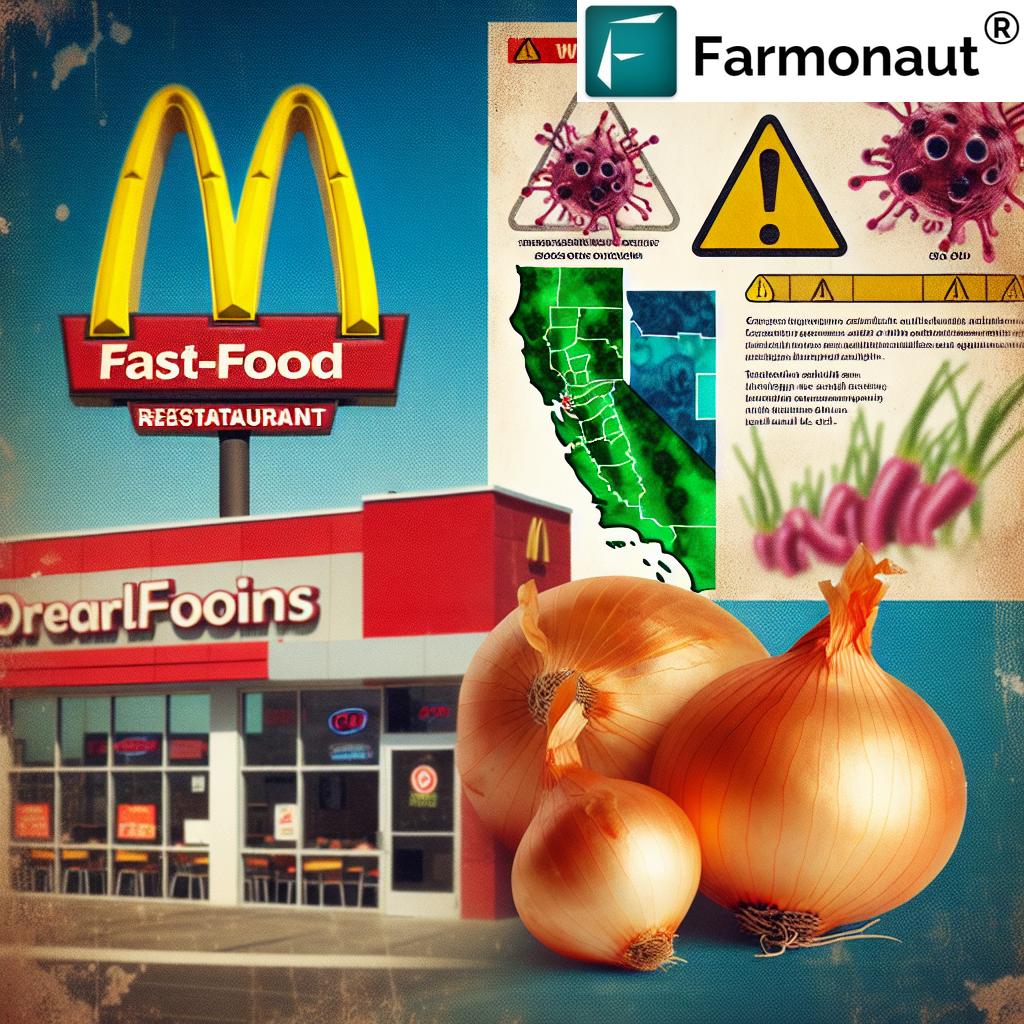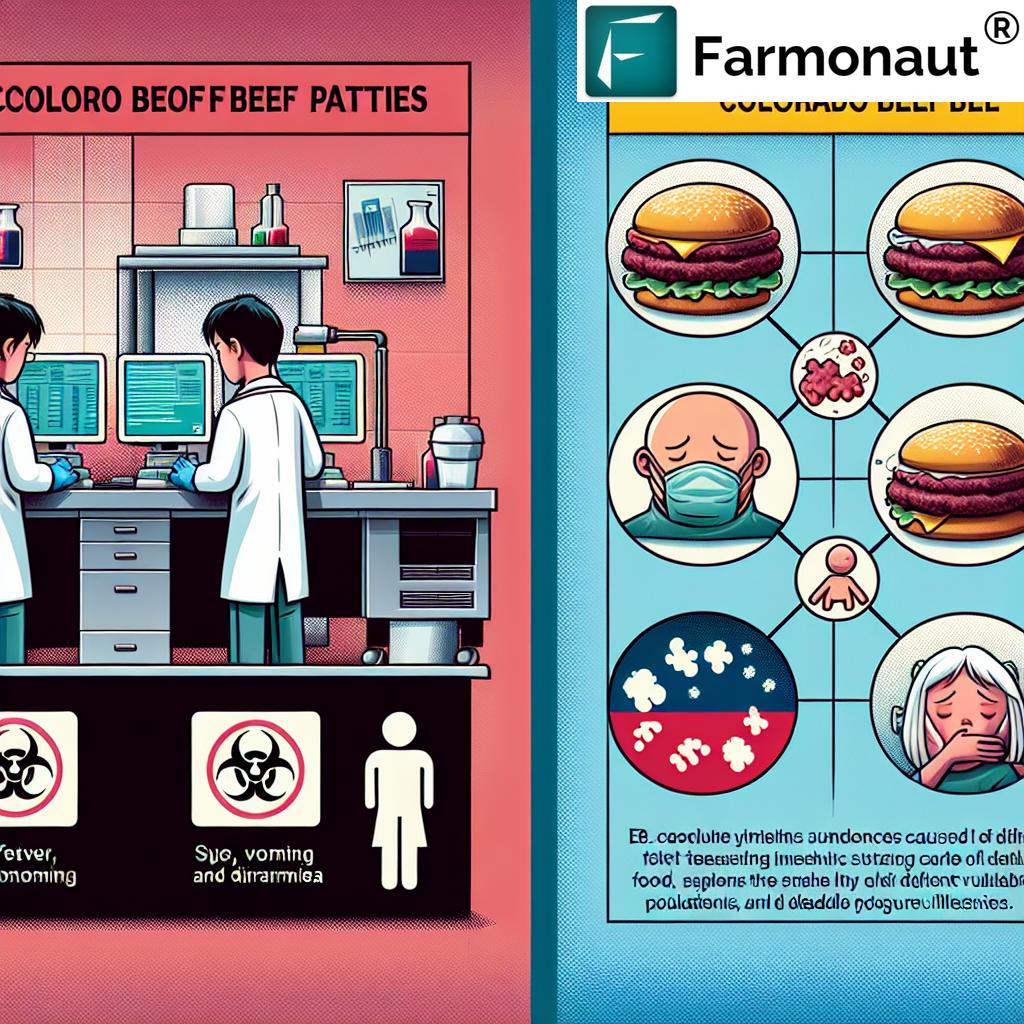Urgent Alert: McDonald’s E. coli Outbreak Shocks Nation – Colorado Beef Cleared, California Onions Suspected

A multi-state E. coli outbreak linked to McDonald’s restaurants has sent shockwaves through the nation, prompting an extensive food safety investigation and raising concerns about fast food pathogens. As health officials scramble to identify the source of contamination, recent developments have cleared Colorado beef while pointing to California onions as the potential culprit.
Colorado Beef Patties Cleared in E. coli Investigation
On October 22, the Colorado Department of Agriculture released a statement announcing the results of their rigorous Colorado beef testing process. The department’s microbiology lab analyzed multiple lots of McDonald’s fresh and frozen patties from various Colorado locations associated with the deadly outbreak.
After examining dozens of subsamples, all tests came back negative for E. coli contamination. This crucial finding has effectively cleared Colorado beef from suspicion in the McDonald’s E. coli outbreak investigation. The Colorado Department of Agriculture has stated that it has completed its testing and does not anticipate receiving more samples.
California Onions Under Scrutiny

While Colorado onions have not been linked to the outbreak, attention has shifted to a California-based produce company as the likely source of the contaminated onions. Taylor Farms, located in Salinas, California, has been identified as the supplier of onions to a McDonald’s distribution facility.
In a significant development, U.S. Foods, a major wholesaler to restaurants nationwide, announced on Thursday that Taylor Farms had issued a recall for peeled whole and diced yellow onions due to potential E. coli contamination. This Taylor Farms onion recall California has raised serious concerns about the Salinas produce company E. coli link.
It’s worth noting that while Taylor Farms also operates a facility in Colorado, this location has not been implicated in the ongoing investigation.
The Scale of the Outbreak
The multi-state foodborne illness outbreak has had far-reaching consequences. As of the latest update on Friday, federal health officials reported that at least 75 people across 13 states have fallen ill due to the outbreak. Tragically, one person from Mesa County has lost their life.
The timeline of the outbreak spans from September 27 to October 11, with some affected individuals reporting travel to other states before the onset of symptoms. At least three people confirmed eating at McDonald’s during their travels.
E. coli Symptoms and Prevention
Understanding the foodborne illness symptoms associated with E. coli is crucial for early detection and treatment. Symptoms typically appear within one to two days of consuming contaminated food and may include:
- Fever
- Vomiting
- Diarrhea (which may be bloody)
- Signs of dehydration (little or no urination, increased thirst, dizziness)
It’s important to note that E. coli infection can be particularly dangerous for certain groups, including:
- Children under 5 years old
- Elderly individuals
- Pregnant women
- People with weakened immune systems
To prevent E. coli infections, experts recommend the following measures:
- Wash hands thoroughly before handling food
- Cook ground beef to an internal temperature of 160°F (71°C)
- Avoid cross-contamination between raw meat and other foods
- Wash fruits and vegetables thoroughly before consumption
- Avoid unpasteurized dairy products and juices
Fast Food Restaurant Food Safety: A Growing Concern
The McDonald’s E. coli outbreak has reignited discussions about restaurant food safety, particularly in the fast-food industry. As consumers increasingly rely on quick-service restaurants for their meals, ensuring the safety of ingredients and preparation methods becomes paramount.
Fast food chains like McDonald’s have extensive supply chains, making it challenging to pinpoint the exact source of contamination in cases like this. However, this incident underscores the importance of rigorous safety protocols and regular inspections throughout the entire supply chain.
The Role of Produce in Foodborne Illnesses
While many associate E. coli outbreaks with undercooked meat, the potential link to onions in this case highlights the risk of contamination in produce. The produce recall California situation serves as a reminder that fruits and vegetables can also be vectors for foodborne pathogens.
Farmers, distributors, and retailers must remain vigilant in their food safety practices to minimize the risk of contamination. This includes proper handling, storage, and transportation of produce from farm to table.
For farmers looking to monitor their crops and ensure optimal growing conditions, Farmonaut’s satellite-based crop monitoring system can be an invaluable tool.
The Impact on McDonald’s and the Fast Food Industry
As one of the world’s largest fast-food chains, McDonald’s faces significant challenges in the wake of this outbreak. The company must not only cooperate fully with the ongoing investigation but also work to restore consumer confidence in its food safety practices.
This incident serves as a wake-up call for the entire fast-food industry to reassess and strengthen their food safety protocols. From sourcing ingredients to preparation and serving, every step of the process must be scrutinized to prevent future outbreaks.
The Importance of Traceability in Food Supply Chains
The McDonald’s E. coli outbreak investigation highlights the critical need for robust traceability systems in food supply chains. Being able to quickly identify and isolate the source of contamination can help limit the spread of foodborne illnesses and facilitate more efficient recalls when necessary.
For those interested in leveraging technology for agricultural monitoring and food safety, Farmonaut’s API offers powerful tools for satellite-based crop analysis.
Conclusion: A Call for Vigilance
As the investigation into the McDonald’s E. coli outbreak continues, it serves as a stark reminder of the ongoing challenges in ensuring food safety across the nation’s food supply. While the clearing of Colorado beef provides some relief, the focus on California onions underscores the complexity of modern food supply chains and the need for constant vigilance.
Consumers, food industry professionals, and regulatory bodies must work together to maintain the highest standards of food safety. By staying informed, implementing rigorous safety protocols, and leveraging advanced technologies, we can work towards minimizing the risk of future outbreaks and protecting public health.
For more information on how technology can aid in agricultural monitoring and food safety, explore Farmonaut’s mobile apps:
As this situation continues to unfold, stay tuned for updates and always prioritize food safety in your daily life. Together, we can work towards a safer and healthier food system for all.
For developers interested in integrating agricultural monitoring into their applications, check out the Farmonaut API Developer Docs.
















